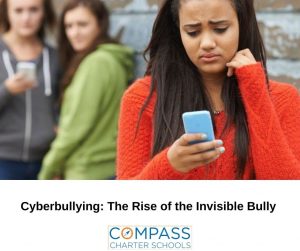October is National Bully Prevention Month, and this month we want to touch on Cyberbullying and its severe effects. Cyberbullying is bullying with the use of digital technologies. It can take place on social media, messaging platforms, gaming platforms, and mobile phones. It is repeated behavior, aimed at scaring, angering, or shaming those who are targeted.
Examples include:
spreading lies about or posting embarrassing photos of someone on social media
sending hurtful messages or threats via messaging platforms
impersonating someone and sending mean messages to others on their behalf.
Face-to-face bullying and cyberbullying can often happen alongside each other. But cyberbullying leaves a digital footprint – a record that can prove useful and provide evidence to help stop the abuse. (https://www.unicef.org/end-violence/how-to-stop-cyberbullying)
Being bullied can leave scholars feeling humiliated, isolated, depressed, ashamed, or even suicidal. Scholars’ mental and physical health can suffer, and there can be a greater risk of developing mental health problems such as anxiety, depression, or low self-esteem. Scholars who are bullied are also more likely to miss or drop out of school. Cyberbullying can become more harmful than face-to-face bullying because it can happen at any time, in locations where a scholar typically feels safe, like at home. It can feel like there is no escaping the taunting and humiliation.
Cyberbullying is often done anonymously, and because cyberbullies can’t see your reaction, they will often go much further in their harassment than they would if they were face-to-face. Thousands of people can also witness cyberbullying. Emails can be forwarded to many; people can comment on photos and posts in a mean and demeaning manner. They can torment a victim 24 hours a day, and with a few clicks, the humiliation can be witnessed by hundreds or thousands of people.
What are some of the warning signs that your scholar may be experiencing cyberbullying:
They are using their device much more or less frequently than previously
They appear more anxious than usual when on their phone or computer
They hide their phone or devices from you
Their social media accounts are suddenly shut down, or new ones are opened
They may withdraw from friends, family, or activities that they typically enjoy
Their grades are suffering
They change in mood, appetite, behavior, or become depressed or withdrawn.
They become irritable or distressed after being online.
If you think that your scholar is a victim of cyberbullying:
First Notice – Pay attention to the signs above and prepare to discuss them with your scholar.
Talk to them – Find out how it started, what is happening, and who is involved.
Keep Documentation – Keep a record and take screenshots, if possible. Most laws and policies note that bullying is a repeated behavior, so keep records to document it.
Report – If a classmate is cyberbullying, report it to school. You can also contact social media platforms (details in resources below), report illegal behavior, and report it to the police.
Support them– Parents, teachers, counselors, mentors, and trusted adults can sometimes intervene positively to influence and redirect a harmful situation. They can also reach out to the scholar who is doing the actual bullying and work with them. And they can determine if a more serious intervention is necessary.

